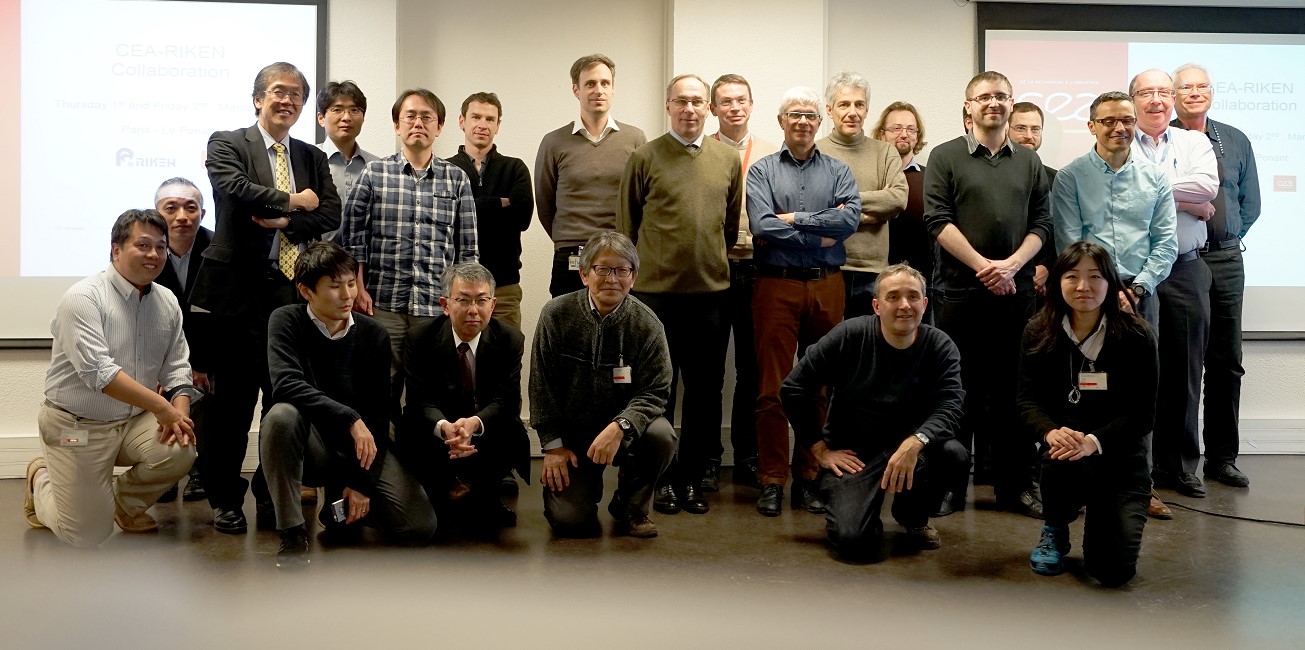High Performance Computing (HPC) is the basis for numerical simulation and for big data processing, which are key enablers for excellence in science and industrial competitiveness and economic growth.
France and Japan both have national projects for next generation supercomputers (2020- 2025), and foster co-design with industrial partners and research organizations. There is also a strong convergence of viewpoints on technological and methodological options: ARM processor technology, open software ecosystems interoperability between architectures, co-design and partnership with industrial technology suppliers, and development of user ecosystems.
After one year of intensive collaboration in HPC, the French and Japanese teams, from different CEA divisions (France) and from RIKEN R-CCS, are now foreseeing the active continuation of this productive work and jointly looking forward to perspectives for 2020 and beyond. The challenges to be tackled for this purpose encompass energy-efficiency of the computing system; their ease-of-use and overall productivity – how they can be programmed to enable important applications for science and society; the cost effectiveness of the solutions.
The CEA and RIKEN HPC collaboration covers the development of open source software components to address these challenges, from middleware and operating system level to applications, as well as training efforts and reflections on benchmarking. The developments are organized to benefit both mainstream and emerging HPC architectures (e.g. x86 as well as ARM-based).
The CEA and RIKEN HPC experts met in Paris early March 2018 for a plenary meeting and progress review of their collaboration. The following topics of the collaboration were discussed during the two days:
- programming environments and languages, runtime environments, and energy-aware job schedulers technical topics;
- the performance and effectiveness indicators and metrics– with the central concern of designing useful and productive computers with the best possible efficiency;
- human resources, training and skill generation
- lastly, the first applications proposed in the collaboration, dealing with quantum chemistry and condensed matter physics, and the seismic resistance of nuclear facilities.
Detailed multi-annual tracks of action had been defined for each topic, and the work plan for Year 1 has been fulfilled. In addition to extensive mutual information and setting up different threads of action, some salient achievements can already be highlighted, such as extensions and coupling of CEA and RIKEN programming environments (resp. so-called MPC and XMP).
[1] La société
ARM vend des licences d'architectures relativement plus simples que
d'autres types de processeurs, et à consommation électrique optimisée;
dominants dans le domaine de l'informatique embarquée - téléphonie
mobile et tablettes – les processeurs de type ARM deviennent désormais
crédibles également pour le calcul haute performance
[2] microprocesseurs compatibles avec le jeu d'instructions Intel
About the CEA- RIKEN High Performance Computing agreement
The CEA-RIKEN High Performance Computing agreement was signed in Tokyo on January 11, 2017, in the more general framework of a collaboration agreement between Japanese Ministry for Education, Culture, Sports and Science and Technology (MEXT) and French Ministry of Higher Education, Research an Innovation (MESRI).
It is intended to enable France and Japan to join forces in the worldwide race on this strategic topic. The French and Japanese approaches show a number of similarities, not only in their technological choices but also in the importance given to the construction of user ecosystems around these new supercomputers. HPC is considered a strategic area for France and Japan in terms of national sovereignty as well as in scientific and economic terms. HPC is the basis for numerical simulation and for processing of large volumes of data.
About HPC at the CEA
CEA is a major player all along the advanced computing and HPC value chain, from technologies to usages. Different CEA divisions are active in the development of silicon technology, architecture of processors, artificial intelligence hardware and software; as well as supercomputer co-design, HPC software environments, programming tools and algorithms, and development of large scale applications for modelling and simulation. CEA operates world-class computing resources and delivers related services, in particular for research (TGCC) and industry (CCRT). CEA divisions make intensive usage of HPC in a wide diversity of areas in fundamental research, energy, global security, health and climate.About HPC at RIKEN
RIKEN, founded in 1917, is Japan's largest multidisciplinary research institution, with a staff of 3400 persons and a budget of 750 million euros; it plays a leading international role in the fields of physics, biology, medical research, engineering and computing. It hosts and operates the K-computer, the world's most powerful supercomputer between 2011 and 2013 and still among those with the highest performance. RIKEN is leading the national post-K supercomputer project with the goal of starting public service around 2021, coordinating R&D and industrial efforts with the needs of the applications in order to produce effective and productive computing systems and solutions.
CEA and RIKEN HPC experts met in Paris early March 2018 for a plenary meeting and progress review of their collaboration in the framework of the CEA- RIKEN High Performance Computing agreement. © RIKEN

The CEA supercomputing complex (TGCC) at Bruyères-le-Châtel hosts multi-petaflops supercomputers used by French and European researchers, and by industry (the Computing Centre for Research and Technology – CCRT – is dedicated to industrial usage). Since 2014, the French government has also tasked CEA with co-designing sustainably competitive high-performance computers. This action comprises an ambitious R&D programme with selected industrial partners, in order to steer the evolution of the architecture and software environment of supercomputers towards exascale. © CEA/Dam